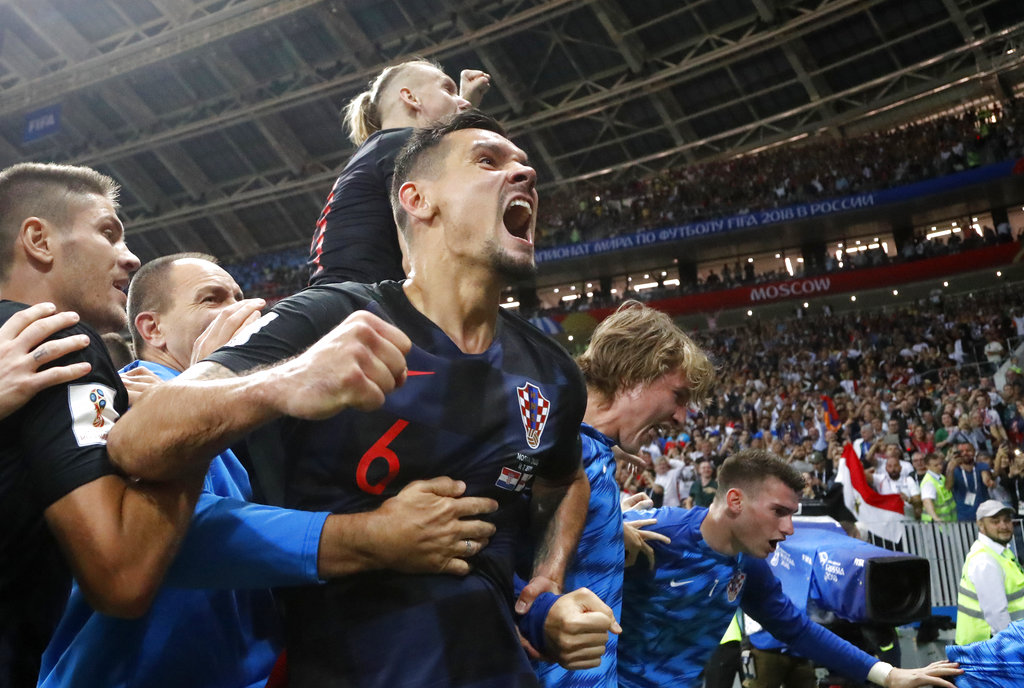Underdog status suits Croatia perfectly for World Cup final

Croatia’s Dejan Lovren celebrates after Croatia’s Mario Mandzukic scored his side’s second goal during the semifinal match between Croatia and England at the 2018 soccer World Cup in the Luzhniki Stadium in Moscow, Russia, Wednesday, July 11, 2018. (AP Photo/Frank Augstein)
MOSCOW — A billion-dollar assembly of stars makes France the favorite for the World Cup final, a scenario that Dejan Lovren is pitching as perfect for Croatia’s biggest ever game.
“We love to be the underdogs,” Lovren said in the wake of Croatia’s England 2-1 extra-time win over England.
Article continues after this advertisementWith a population of 4.3 million and a history of struggle, it’s easy to see why. Not since Uruguay’s win in 1950 has a country of so few people reached a World Cup final.
Croatia’s players were born around the time an independent Croatia emerged from the wars which divided the former Yugoslavia in the early 1990s. Lovren and star midfielder Luka Modric were refugees as children.
Croatia still struggles economically and its football scene has been riven with hooliganism, crime and politics.
Article continues after this advertisementIt’s a country that breeds toughness in its players.
The key to Croatia’s success in Russia, Lovren said, is “Our mentality.”
“War, all these things and even now the situation is not the best,” he said. “It’s unbelievable how many talents we have in sports.”
Two years ago, Croatia’s campaign at the 2016 European Championship was overshadowed by turmoil in the stands as fans hurled dozens of flares onto the field in protest against the football federation leadership. A year before that, a swastika was drawn on the field before a national-team game.
Those episodes have led to sanctions from soccer’s international governing body, but Lovren is hoping the squad’s success at this World Cup will mark a turning point for the country.
“It’s not just football, it’s a bigger picture for us unfortunately,” he said. “Us players, now we change something and everyone is proud of us in Croatia.”
Despite the Balkan nation’s small population, it is a veritable talent factory in a wide range of sports. There’s the former U.S. Open tennis champion Marin Cilic, a raft of current and ex-NBA players, Olympic champions in skiing, discus and the country’s beloved water polo.
Most of all, Croatia is an export market for quality footballers, with a squad boasting stars for Real Madrid, Barcelona and Juventus.
Until now, Croatia’s greatest moment on the football pitch was reaching the World Cup semifinals in 1998, the country’s first tournament after becoming independent.
Stars of that team remain household names in Croatia, including the football federation president and ex-Real Madrid striker Davor Suker, who has been with this squad all the way through this World Cup campaign. After the quarterfinal win over Russia, Suker said he’d be delighted if Modric replaced him as Croatia’s greatest player of all time.
Instead, he said, “I’ll be the greatest president!”
Now that the 2018 squad has gone a step further than the 1998 semifinalists, Lovren and Croatia are creating a narrative beyond anything they experienced as children when the stars of the national team were etched into folk lore following a semifinal loss to France.
“I was only nine. I remember my mum was screaming, she was crying after the French game,” Lovren said. “After 20 years people will remember us not any more (than just) ’98 — and this is what I wanted.”